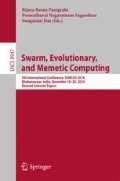Abstract
In order to make reservations for cloud services, consumers and providers need to work on Service Level Agreements (SLAs) to achieve negotiation. Since cloud computing represents a category of distributed system, negotiation should be established between service providers and consumers in a faster and reliable manner. Automated Negotiation is such a process that is closely associated with Multi-agent Systems. We propose A Negotiation system using fuzzy ontology is addressed by us in this research work where the cloud service specification and consumer requirements with vagueness are stored on cloud ontology. Here, each party needs to choose its own agent in order for negotiation. Agents have both consumer’s and provider’s details and their hard and soft preferences for a particular service. Agents need to negotiate on the basis of a set of Quality of Service (QoS) parameters like duration, availability, price etc. as required by the user. On completion of the negotiation process, user receives a feedback from the agent regarding the probability of negotiation. This negotiation framework is dynamic and efficient in nature.
Access this chapter
Tax calculation will be finalised at checkout
Purchases are for personal use only
References
Zhang, Q., Cheng, L.: Cloud computing: state-of-the-art and research challenges. J. Internet Serv. Appl. -Springer 1(1), 7–18 (2010)
Dastjerdi, A.V., Tabatabaei, S.G.H., Buyya, R.: A dependency-aware ontology-based approach for deploying service level agreement monitoring services in cloud. Softw. Pract. Experience 42(4), 501–518 (2012)
Zulkernime, F.H., Martin, P.: An adaptive and intelligent SLA negotiation system for Web servcies. IEEE Trans. Serv. Comput. 4(1), 31–43 (2011)
Emeakaroha, V.C., Brandic, I., Maurer, M., Dustdar, S.: Low level metrics to high level SLAs-LoM2HiS framework: bridging the gap between monitored metrics and SLA parameters in cloud environments. In: Proceedings of International Conference on High Performance Computing and Simulation (HPCS), IEEE, Caen, France, June 28 –July 2, 2010
The NIST Definition of Cloud Computing. http://www.nist.gov/itl/cloud/upload/cloud-def-v15.pdf
Chang, Y.S., Yang, C.T., Luo, Y.C.: An ontology based agent generation for information retrieval on cloud environment. J. Universal. Comput. Sci. 17(8), 1135–1160 (2011)
Sim, K.M.: Agent-Based Cloud Computing. IEEE Trans. Serv. Comput. 5(4), 564–577 (2012)
Talia, D.: Clouds meet agents: toward intelligent cloud service. J. Internet Comput.-IEEE 16(2), 78–81 (2012). 1089-7801
Semantic Web. http://www.w3.org/standards/semanticweb/
Gruber, Thomas R.: Towards principles for the design of ontologies used for knowledge sharing. Int. J. Hum.-Comput. Stu. 43(5–6), 907–928 (1995)
Youseff, L., Butrico, M., Silva, D.D.: Toward a unified ontology of cloud computing. In: Proceedings of IEEE Grid Computing Environments Workshop, pp 1–10, Austin, TX, November 2008
Hoefer, C.N., Karagiannis, G.: Taxonomy of cloud computing services. In: Proceedings of IEEE GLOBECOM Workshop on Enabling the Future Service Oriented Internet, pp. 1345–1350, Miami, FL, December 2010
Zimmermann, H.J.: Fuzzy Set Theory-and It’s Applications, 4th edn. Kluwer Academic Publishers, Boston (2001)
Zhao, D.X.: Research of Semantic Service Discovery Based on Fuzzy Logic. Tianjin University, Tianjin (2008)
HP Labs and Open Source Community: Jena Semantic Web Library (2006). http://www.sf.net/
Telecom Italia: JADE (Java Agent DEvelopment Framework) Website (2004). http://jade.cselt.it/
W3C: Web Ontology Language (OWL) (2006). http://www.w3.org/TR/owl-features/
Höfer, C.N., Karagiannis, G.: Cloud computing services: taxonomy and comparison. J. Internet Serv. Appl. 2, 81–94 (2011)
Stanford University: Prot´eg´e Ontology Editor (2006). http://protege.stanford.edu/
Author information
Authors and Affiliations
Corresponding author
Editor information
Editors and Affiliations
Rights and permissions
Copyright information
© 2015 Springer International Publishing Switzerland
About this paper
Cite this paper
Parhi, M., Pattanayak, B.K., Patra, M.R. (2015). An Automated Semantically Enabled Fuzzy Based SLA in Cloud Computing Environment Using Multi-agent System. In: Panigrahi, B., Suganthan, P., Das, S. (eds) Swarm, Evolutionary, and Memetic Computing. SEMCCO 2014. Lecture Notes in Computer Science(), vol 8947. Springer, Cham. https://doi.org/10.1007/978-3-319-20294-5_38
Download citation
DOI: https://doi.org/10.1007/978-3-319-20294-5_38
Published:
Publisher Name: Springer, Cham
Print ISBN: 978-3-319-20293-8
Online ISBN: 978-3-319-20294-5
eBook Packages: Computer ScienceComputer Science (R0)

